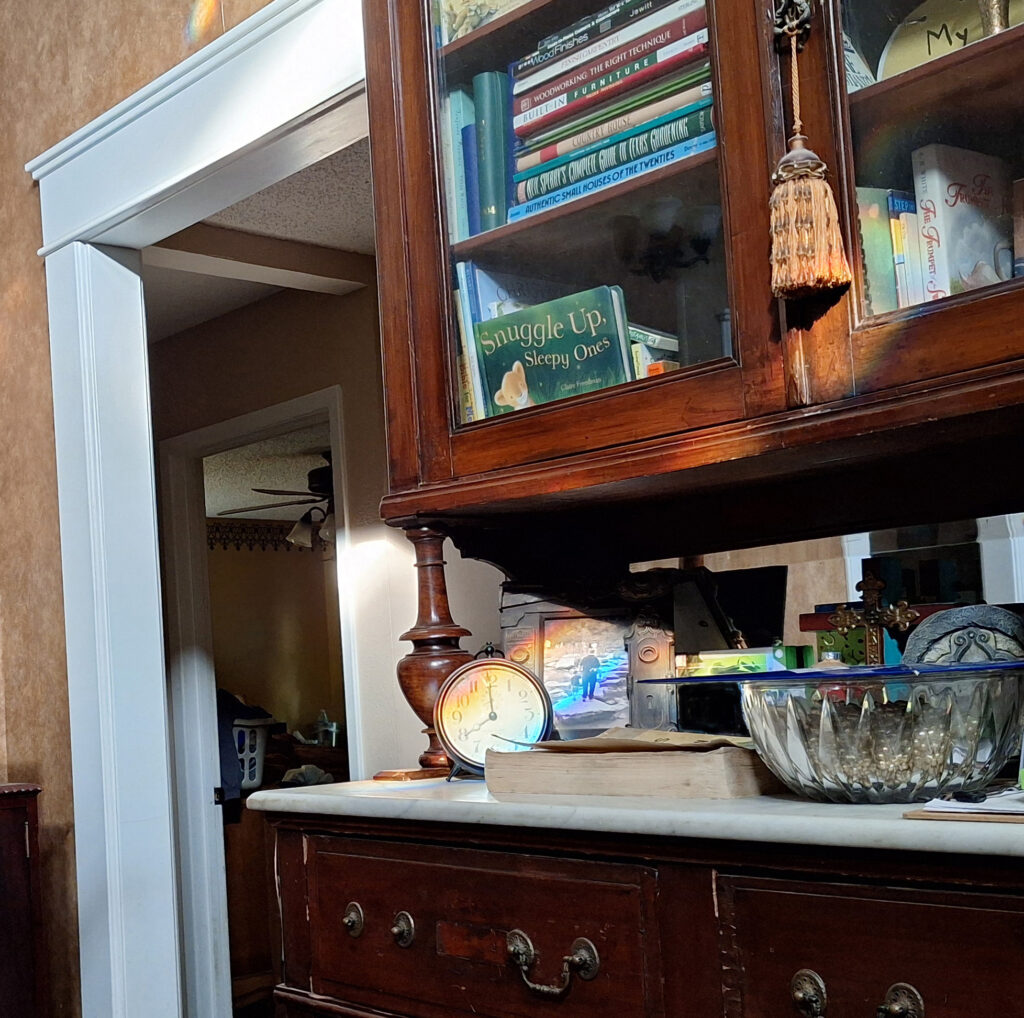Joseph—forgiving
Today on Choosing Peace, you’ll read about a creative Old Testament spin, playing golf and a dog named Rosie.
Last time, we explored the first half of Joseph’s key verse (“As for you, you meant evil against me…” ~ Genesis 50:20a, NHEB). We unpacked how that powerful reality was demonstrated in Joseph’s life and recently in our family. I need to unpack more of the Bible passage where we find this key verse.
Background
Joseph was a very powerful man—second only to Pharaoh, king of Egypt. Joseph’s brothers and their families had lived in Egypt and Joseph had provided for them all for 17 years. (Their father Jacob was 130 years old when they arrived, and he died at age 147.)
Waiting and waiting
Now that Jacob was dead, Joseph’s brothers were afraid that it was Retribution Time. Did Joseph’s brothers wait until after Jacob’s death to acknowledge their evil in plotting to kill Joseph and then selling him into slavery? Did they wait 17 years after arriving in Egypt to speak the obvious truth? Did they wait until they were worried about their own skin?
When Joseph’s brothers saw that their father was dead, they said, “It may be that Joseph will hate us, and will pay us back in full for all of the evil that we did to him.” So they sent a message to Joseph, saying, “Your father gave this command before he died, saying, ‘Thus you are to tell Joseph, “Now please forgive the transgression of your brothers and their sin, because they did evil to you.”’ And now, please forgive the transgression of the servants of the God of your father.” And Joseph wept when they spoke to him.
Genesis 50:15-17, New Heart English Bible
We find the word “forgive” in only one verse in the 50 epic chapters of the book of Genesis. One single verse: Genesis 50, verse 17, above.
Certain aspects of this Bible passage jump out at me.
Evil and envy
Now that Jacob was dead, Joseph’s older brothers basically realized: “Uh-oh. We’re in trouble now.” They were terrified that it was Payback Time for “all of the evil” (v. 15) they’d done to Joseph. Did that include, perhaps, considerably more evil than plotting to kill him and selling him into slavery when Joseph was 17? I suspect so, given (1) the parental favoritism, (2) the Us vs. Them teams in the family, and (3) the powerful undercurrent of “we hate Joseph” sentiment amply evidenced years ago. Yes, indeed. I believe there was much more to this violent story.
After Joseph’s extended family moved to Egypt, did Joseph and his older brothers become pals and start playing golf together on the weekends? I suspect not. During the first 17 years of his life, Joseph was his father’s favorite son and an outcast with his 10 older brothers. Now, in Egypt, Joseph was rich, powerful and connected; while his brothers lived outside town working as shepherds—a profession considered by the Egyptians to be “an abomination.” His brothers were jealous enough of Joseph’s fancy coat—a gift from their father—to plot his murder (coupled with their anger about his dreams, where they were bowing down to him). How, pray tell, would they respond to Joseph being Pharaoh’s right-hand man? In charge of the whole nation of Egypt? We can do the math here, Peaceful Readers. We can do the math.
Envy is a dangerous, violent, insidious thief.
I can’t overstate the danger presented by the sin of envy. It isn’t simply wanting what someone else has. It’s wanting that person not to have it. Envy can act as the fuel behind a wide range of evil thoughts and actions—including murder or being obsessed with ruining someone’s life. (That reminds me of my deceased sibling, Pam, The Almighty.)
For where envying and strife is, there is confusion and every evil work.
James 3:16, King James Bible
Let me say it again. I believe there was much more to this violent story. Most violence is emotional—and it includes scheming, lying and sabotaging. Explore the addendum about evil in this post.
Highly-motivated and manipulative
Joseph’s brothers were so afraid of retribution that they sent Joseph a message, supposedly with a command from their dead father. Did Jacob actually say what they alleged? I think not. The basic gist of the beginning of that passage is: “They were terrified, so they sent Joseph a message.” The motivation behind the message wasn’t contrition, truth-telling or making things right. It seems to me that Joseph’s brothers composed their message to get themselves out of hot water.
Then Joseph’s older brothers doubled-down and claimed to be like-minded in service to God—calling themselves “the servants of the God of your father.” Excuse me? That sounds like some seriously-manipulative sucking up; or you can call it a creative Old Testament spin on “speaking in “we” terms”—one of the 8 warning signs for violence. Translation: “We worship the same God; therefore, we’re on the same team.” Right. Whatever you say. Remember, Joseph’s 3 oldest brothers were called out for their violence by their father Jacob right before he died when he was speaking blessings and prophesies over his 12 sons.
Now that their father was dead, Joseph’s brothers finally got around to saying, “Please forgive us.” I guess they decided to humble themselves now that their lives were on the line. What mysterious—I mean revealing—timing. Does their exceedingly-belated apology constitute an attempt at charm and niceness—another one of the 8 warning signs for violence? Absolutely. This warning sign—“charm and niceness”—basically means “saying something to get into someone’s good graces,” better known as schmoozing.
Feelings or lack thereof
Who wept during this pivotal scene? Joseph. Who wept when Joseph revealed himself to them 17+ years earlier in chapter 45? Joseph and his younger brother Benjamin. Who wept when their father died? Joseph. Where were his older brothers’ tears? Just askin‘…. The Bible mentions Joseph’s tears these 3 times (and also in Genesis 42.) It mentions the tears of his older brothers not once. (Judah’s tender heart was revealed beautifully in chapter 44. See part 11.)
What can I say. From the information contained in the Bible, 9 out of Joseph’s 10 older brothers remind me of some of our relatives—always focused on #1—themselves. This particular scene left a really bad taste in my mouth since it reminded me of disturbing, manipulative encounters with certain relatives. Her Majesty wrote in her recent manifesto: “Walter and I pray daily that we might find the wisdom to solve the problems that keep us apart.” Thus saith the evil sociopath masquerading as a concerned Christian. (To explore why evil people pretend to be Christians, read the section called Using the Religious Cover in this important post.)
 Now it’s time to dig into the next part of our key verse.
Now it’s time to dig into the next part of our key verse.
Turning evil into good
In Joseph’s life, we know very clearly how God turned his brothers’ evil into good.
“As for you, you meant evil against me, but God turned it into good in order to bring about this present result, to save the lives of many people.”
Genesis 50:20, New Heart English Bible
The nation of Egypt, the nation of Israel, and countless others were saved because God brought Joseph to Egypt and raised him up to a very high and influential position where he stored vast quantities of grain before the devastating famine.
True nature—kindness
Joseph’s words to his brothers didn’t end with the key verse above.
“So therefore, do not be afraid. I will provide for you and your little ones.” And he consoled them and spoke kindly to them.
Genesis 50:21, NHEB
Despite the highly-suspicious and terribly-belated timing of his brothers’ apology—and despite everything they’d done against him—Joseph remained true to his nature and character. While Joseph didn’t explicitly say, “I forgive you,” I believe his response above clearly indicates that he did. (To explore the relationship between forgiving, compassion and kindness, read this post.) Joseph was tenderhearted, generous and kind. Why? Because Joseph’s heart belonged to God. He was humble, obedient and fully devoted to God. Besides, the nation of Israel could not be founded on the execution of 10 out of the 12 heads of the tribes—even though Joseph could’ve easily and swiftly done just that, and would’ve been well within his rights to do so. But God had a better plan.
Joseph’s kindness was a demonstration of the Lord’s kindness.
After I typed those words, our great room brightened up as the sun shone and reflected off our clock and an old photo of Brandon and Logan. Where did the rainbow colors come from? The beveled glass windows my in-laws made for us years ago—mounted high in our great room. Even though the windows were made and given to us to loan shark us and keep us indebted and enslaved, God uses the windows to give us sparkles and rainbows. I love that.
What she meant for evil
How did Her Majesty’s manifesto featured in the last post demonstrate our key verse, Genesis 50:20a-b?
“As for you, you meant evil against me, but God turned it into good in order to bring about this present result….”
Genesis 50:20a-b, New Heart English Bible
Her Majesty’s attack letter certainly displayed her evil, including 7 out of the 8 warning signs for violence, epic lying, major drama and manipulation. She reminded us, pointedly, of who and what she is—a dangerous, violent sociopath and malignant narcissist. Remember—most violence is emotional. (Drink in the list of emotional violence here.)
How did God use Delia’s evil for good in our lives?
Powerful warning
Her Majesty answered part of that question in paragraph #2 of her letter: “I am 86 and will not live here forever.” The drama and contacts will be reactivated before and after Her Majesty dies. A wise friend mentioned that the drama won’t be over even after the dust settles from the funeral. Her comment reminded me of what happened after Pam, The Almighty died. Our sibling Linda stepped up and took her place. It was eerie and extremely unexpected. What did I learn? When a power vacuum exists, an accomplice will often claim the position of mob boss.
I was so thankful for my friend’s warning. Will the new mob boss be Brandon’s sister Hazel or her daughter Chloe? Or someone else? That remains to be seen.
Let me ask this very important question again. How did God use Delia’s evil for good in our lives? Her Majesty’s manifesto served as a serious warning. We must be prepared—mentally, emotionally, spiritually. The attack letter provided a powerful confirmation of what we’d already learned and what God already urged us to do—acknowledge evil, avoid evil and remember our mantra about evil (“You play, you lose”). God is our protector, and we must cooperate with him.
We must do our part,
and we can trust God to do his part.
Help
Also, many other people are dealing with the exact same thing. Some are still in The War Zone. Others live in chains due to their traumatic past. I pray that Choosing Peace will help people. Read about The Healing Journey, and follow the links to many other posts.
Your turn
Has someone launched attacks against you or someone close to you? Are there any accomplices? Have you experienced the destruction of Us vs. Them thinking? Hostility? False accusations? Chaos? Troublemaking? Manipulation? Gossip? Drama? Lies? Verbal, physical or sexual assault? If any of those things sound familiar, take out your journal or a piece of paper and explore these issues. Think carefully about what was said and not said, done and not done. What was said or done to confuse you or throw you off guard? Has God given you any warning dreams or nightmares?
Read the 8 warning signs for violence listed below, featured in The Sneak Attack, part 2 through part 6. Which signs have you seen? What do they tell you?
Red flags for sociopaths
In her article, “How to Spot—and Handle—a Sociopath,” Lisa Wolcott shares warning signs for violence… “a menu of sociopathic characteristics” from a book she recommends. I’ve summarized most of the descriptions below. We need to become really familiar with this list. Study it. Think about the times when people have used these tactics against you.
1. Forced teaming
Sociopaths lie to their victims, claiming to have a predicament or problem in common with them.
2. Speaking in “we” terms
Sociopaths use the word “we” to manipulate their victims and pretend to be connected in some way.
3. Charm and niceness
Sociopaths use charm/niceness to manipulate their victims and “to disarm their mistrust.”
4. Too many details
“If a person is lying they will add excessive details to make themselves sound more credible to their chosen victim.”
5. Typecasting
Sociopaths insult their intended victims to get them entangled in conversation to prove the sociopath wrong.
6. Loan sharking
Sociopaths will “help” victims even when they haven’t asked for help so victims will feel obligated to reciprocate. Sociopaths frequently say “You owe me” in various ways.
7. The unsolicited promise
“A promise to do (or not do) something when no such promise is asked for; this usually means that such a promise will be broken. For example: an unsolicited, “I promise I’ll leave you alone after this,” usually means the chosen victim will not be left alone. Similarly, an unsolicited “I promise I won’t hurt you” usually means the person intends to hurt their chosen victim.”
8. Discounting the word “No”
“Refusing to accept rejection. “No thanks, I don’t need help,” the victim says. “Nonsense—it’s no trouble, we’re almost here!” says the sociopath.”
Pray and ask God to reveal the truth to you. And remember from part 15:
Know your adversary and obey the Holy Spirit.
God’s protection
Delia’s attack letter gave us an essential reminder about who she is and a powerful warning about what’s to come. We just reviewed the 8 warning signs for violence.
How else did God use my mother-in-law’s evil for good in our lives?
Shining a spotlight on characteristics of evil illuminates the Lord’s protection.
The non-stop warfare
After reading Her Majesty’s manifesto and part 16, one of my Peaceful Readers was struck by Delia’s total lack of feelings and described her as diabolical, which means “of the devil.” What a perfect description. This particular reader was, frankly, amazed that Brandon lived. As I pause to reflect on the bits and pieces that I know, I am too. The non-stop psychological and spiritual warfare—the evil—was inescapable.
The danger
From part 3 of The Holy Spirit:
Danger at home
Brandon grew up in a very dangerous place—physically, mentally and spiritually. His parents were both sociopaths, his sister Shelly was extremely violent, and so was his grandfather who lived next door. When Brandon was a boy, his grandfather used to beat him with a horse bridle—with its leather straps and the metal bit at one end. Brandon mentioned this to me for the first time last month, saying he probably deserved it. I told him that he most certainly did not. No one does.
Danger away from home
When Brandon was young, he rode his bike. When he got older, he rode motorcycles. He had to escape, physically, from the farm. He had to get away from that place. From those people. But there was danger away from home too. God saved Brandon’s life multiple times from car and motorcycle wrecks.
Delia’s parents lived next door. The grandfather who beat Brandon with a horse bridle was Delia’s (and Uncle Henry’s) father. He was well-regarded in town—a big-shot at church, president of the school board, etc. But at home—oh-so-frightening.
Protected and saved
When his grandfather was beating him with the horse bridle, Brandon could’ve been blinded. But he wasn’t. When Andrew, Brandon’s father, had him lie in water under their house while working on live wires, Brandon could’ve been electrocuted. But he wasn’t. When his father had him working on their high, steep Victorian roof, Brandon could’ve fallen and been killed. But he wasn’t. When the tornado ripped through their farm, Brandon could’ve been ripped up with the trees. But he wasn’t.
Death loomed imminently over Brandon time and time again. But God saved him. Brandon’s story wasn’t finished. His escape from Sociopathville wasn’t yet achieved. His life in Christ hadn’t begun yet. His son wasn’t born yet.
The Lord’s mighty angels watched over Brandon and still do.
For he will put his angels in charge of you, to guard you in all your ways.
Psalm 91:11, New Heart English Bible
Gratitude
I thank the Lord for the honor of being a part of such a hard story. For the honor of shining light into such darkness. For the freedom Brandon’s story gave to me—allowing me to finally see the darkness in my own story.
For much more about the Lord’s protection, see these two sections in the index: Protected by God and Miracles.
The Lord’s goodness
God also used Delia’s evil—demonstrated so clearly in her attack letter—by shining the light on the Lord’s goodness. We compare our lives when we played The Game and lived in The War Zone with life now, and we see the goodness of God more keenly. We don’t take the peace of our Safe Zone for granted.
Our sailboat
We purchased our sailboat on Her Majesty’s birthday the year we left The War Zone. We’d been looking at sailboats for several months, and the Lord brought everything together on that particular, important day. That’s also the day when Uncle Henry called my phone after I accidentally left it at home. Soon afterwards, Brandon received Uncle Henry’s attack letter—his mighty manifesto. Read part 1 of The Sneak Attack for the show-stopping unfolding of those events.
Through the last 9 years, time on our sailboat has offered a respite from busy-ness, from technology, from distractions. While sailing can sometimes provide an adventure—like the time when our sail broke—the best word to describe sailing is peace. We’re in the Lord’s hands. We’re gliding through the water. We’re moving with the wind. We’re hearing and seeing the birds, ducks and geese. We’re waving at the other boaters. We’re experiencing the beauty of what the Lord made.
Ho lidays and Rosie
lidays and Rosie
Holidays used to be minefields of chaos, drama, rejection, attacks and more—before, during and after. Now that we’ve left The War Zone, drawn firm boundaries, and replaced old ways with better ways, we actually look forward to special days. That’s a monumental change. TBTG! What are holidays like at The Smythe House? Quiet. Simple. Peaceful. Flexible. Low-stress. Just the three of us—and our dogs.
Speaking of the Lord’s goodness, I need to introduce you to our new dog. Let’s call her Rosie. I mentioned our search for a new dog briefly in part 6, and we got Rosie right after Christmas. What an absolute honey. Adorable. Happy. Fun. Loving. Smart. Rosie is precious beyond words. Brandon says her joy is infectious and he is right. Joy, joy, joy.
Strength
Battling the darkness of evil on both sides of our family has strengthened us in unexpected ways. We know who’s for us and who’s against us.
Logan told me last weekend that he removed everyone on Brandon’s side of the family from his Facebook account. I told him that was a very good thing to do. Even though he rarely looks at Facebook, Logan’s decision was a defensive move. A protective move. A wise move. I’m so proud of him. Most 22-year-olds haven’t received a letter like Her Majesty’s manifesto. While it stung, it also strengthened. When the surprise wore off, our resolve was bolstered big-time. I’m truly grateful for that.
Peaceful Readers, I’d be remiss if I didn’t acknowledge how painful Her Majesty’s manifesto was for Brandon. It hurt deeply at the time, and still does. Honestly, I can’t imagine how it would feel to be attacked like that by one of my parents. Brandon mentioned that it was his mother’s job to protect him from harm. Obviously, she did the exact opposite—bent on his destruction.
I believe Brandon will someday be able to reflect on the ways God used his mother’s attack for our good. And I’m praying for his healing and peace.
The reality of spiritual warfare
Every person encounters spiritual warfare. As the children of God, our assignment in this war can vary widely. Some people serve as prayer warriors for others. Some people nurture those in the fray. Some people teach God’s word to strengthen everyone with the truth. Others are on the front lines doing battle with the darkness. Just as every role in the military is vital—from cooks to mechanics to soldiers—every role in the Kingdom of God is vital. We need each other.
Many Christians glibly ignore the evil and spiritual warfare so obviously raging. Their denial and comfort are more palatable. I understand that; I used to live that way. Ask God what role he’s chosen for you. Be diligent in prayer.
Enemies
In part 15, we explored the blessings and prophesies spoken by Jacob over his sons. This portion of his blessing to Joseph reveals an important truth about the spiritual warfare in Joseph’s life.
The archers will attack him with bitterness, and shoot at him, and harass him. Yet his bow will remain steady, and his arms will be made agile by the hands of the Mighty One of Jacob, by the name of the Shepherd, the Rock of Israel, by the God of your father, who will help you….
Genesis 49:23-25a, New Heart English Bible
Joseph’s power, authority and money didn’t eliminate opposing forces. Is it possible that his elevated status—as “the prince among his brothers” (v. 26) and the whole nation of Egypt—actually put an even larger target on his back? Heavier warfare than his time in slavery? More than his years in prison?
A bold warrior for God
We don’t know the details about his enemies after he met Pharaoh, but we know that Joseph was a bold warrior for God Almighty, strengthened for every battle, protected from evil forces, walking in favor with God and man. In verse 23 above, the archers that Jacob spoke of were shooting at Joseph. They weren’t trying to annoy him. They were trying to kill him. Joseph’s enemies were fierce—attacking him “with bitterness”—but God remained faithful, mighty and victorious.
Our refuge
Peaceful Reader, have you ever encountered fierce enemies? We sure have.
God is our refuge and strength, a very present help in trouble.
Psalm 46:1, New Heart English Bible
We thank you, deeply, for every prayer lifted on our behalf. Prayer is powerful.
 Choosing peace
Choosing peace
Brandon and I went sailing a couple weeks ago. At times, the wind was light. Other times, it was more forceful. Even when the wind blew briskly against the sails and we leaned with our sailboat, we saw the shore. To our eyes, the shore was unmoving. Fixed in place.
We’re journeying in a beautiful place occupied by two forces—the army of God and the army of Satan. Sometimes the winds of spiritual warfare blow hard. We trust our boat to hold us safely. We lean with it. Sometimes we grab something to steady ourselves. Other times feel like smooth sailing. And other times are completely still.
In the midst of spiritual warfare, in the midst of a vicious attack, how do we choose and experience peace? By looking up and focusing on the highest truths.
Who is God? The omnipotent Creator. My loving heavenly Father. The righteous judge, full of mercy and compassion on his children. Who is Jesus? The Good Shepherd. My Lord and Savior. The Lion of Judah.
Who is the Holy Spirit?
The Counselor. My Protector. The still, small voice.
Always and forever, hold fast to the Lord. He is the same—yesterday, today and forever.
Coming next: How did the story of Joseph end? What have we learned from his life? I’m really looking forward to re-reading these 17 posts and discovering the big takeaways.
Until next time, thanks for reading and for Choosing Peace.
Truth from The Word: Romans 16:25-27
Song: “Christ Is Mine Forevermore” by CityAlight
More: To stay current on recent posts, sign up for my monthly newsletter.



